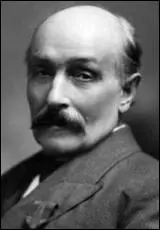William Cremer

William Cremer was born in Fareham, Hampshire, on 18th March, 1828. His father, a coach painter, deserted the family when he was a child. His mother, a devout Methodist, sent him to a church school until becoming an apprenticed carpenter at the age of fifteen.
Cremer was an active trade unionist and took part in the campaign for the nine-hour day in 1858. He also helped to establish the International Working Men's Association and the Amalgamated Society of Carpenters and Joiners. A pacifist, Cremer was a leading advocate of settling international disputes by arbitration.
Following the 1867 Reform Act, the working class made up the majority of the electorate. Cremer, a member of the Liberal Party, stood for Warwick in the 1868 General Election. He campaigned for the secret ballot, compulsory education, direct taxation, reform of trade union law, and international boards of arbitration to adjudicate disputes among nations. Cremer was defeated and also failed to be elected in the 1874 General Election.
In 1870 Cremer formed the Workmen's Peace Association. Initially it promoted England's neutrality during the Franco-Prussian War but eventually became the forerunner of the International Arbitration League (IAL).
The passing of the 1884 Reform Act made it easier for trade unionists to be elected to Parliament. The following year Cremer was elected to the working-class seat of Haggerston in London. Cremer used the public platform of the House of Commons to argue for international boards of arbitration to adjudicate disputes among nations. In 1888 he joined with the French politician, Frederick Passy, to form the Interparliamentary Union in Paris. The following year he became editor of the peace journal, The Arbitor.
Cremer was defeated in the 1895 General Election. but won his seat back five years later. Cremer's work for international peace resulted in him winning the Nobel Peace Prize in 1903. He immediately gave £7,000 of the £8,000 prize to the International Arbitration League. Cremer, who was secretary of the IAL, later gave an additional £1,000 to the organization.
In the House of Commons Cremer, now a member of the Labour Party, campaigned for the rights of working class men but was strongly opposed to women's suffrage and was involved in the forming of the Adult Suffrage Society. This brought him into conflict with his party leader, Keir Hardie, a passionate supporter of women's rights.
William Cremer died of pneumonia on 22nd July, 1908.
Primary Sources
(1) Report in Hansard on the speech made by William Cremer in the House of Commons on women's suffrage (25th April, 1906)
He had always contended that if we opened the door and enfranchised ever so small a number of females, they could not possibly close it, and that it ultimately meant adult suffrage. The government of the country would therefore be handed over to a majority who would not be men, but women. Women are creatures of impulse and emotion and did not decide questions on the ground of reason as men did.
He was sometimes described as a woman-hater, but he had had two wives, and he thought that was the best answer he could give to those who called him a woman-hater. He was too fond of them to drag them into the political arena and to ask them to undertake responsibilities, duties and obligations which they did not understand and did not care for.
What did one find when one got into the company of women and talked politics? They were soon asked to stop talking silly politics, and yet that was the type of people to whom we were invited to hand over the destinies of the country.
It was not only because he thought that women were unfitted by their physical nature to exercise political power, but because he believed that the majority of them did not want it and would vote against it, that he asked the House to pause before they took the step suggested by the honorable member for Merthyr Tydfil (Keir Hardie). He believed that if women were enfranchised the end would be disastrous to all political parties. He therefore asked the House to pause before it took a step from which it could never retreat.

